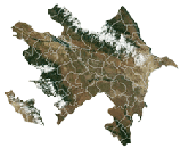46th session of the United Nations Statistical Commission
46th session of the United Nations Statistical Commission was held on 3-6 March, 2015 in New York, USA.
Deputy Chairman of the State Statistical Committee Yusif Yusifov participated in the session and expressed the position of the Committee on various issues.
During the session discussions on broader measures of progress; emerging issue: the data revolution; big data; population and housing censuses; crime statistics; refugee statistics; household surveys; national accounts; international trade and economic globalization statistics; environmental-economic accounting; international comparison programme; agriculture and rural statistics; governance, peace and security statistics; fundamental principles of official statistics; regional statistical development in Latin America and the Caribbean, health statistics; gender statistics; civil registration and vital statistics; business registers; service statistics; finance statistics; environment statistics; statistics for economies based on natural resources; world statistics day; coordination of statistical programmes; statistics of human development; international statistical classifications; common open standards for the exchange and sharing of data and metadata; statistical capacity-building; development indicators; integration of statistical and geospatial information; follow-up to policy decisions of the general assembly and the economic and social council were carried out.
It was the first time since the establishment of the Commission that the topic on organization of Refugee statistic discussed as an independent item. The document is reflected organization of refugee statistics, as well as, preparation of terminology, collection and publication of statistical data in this field, preparation of new methodology.
The State Statistical Committee of the Republic of Azerbaijan expressed its position in the previous session on including of this issue to the agenda of current session. By this purpose the State Statistical Committee sent a letter to the Statistical Division of UN, and also prepared the document on collection and dissemination of statistics on refugees and internally displaced persons and sent it to the Statistical Division for presenting it in the session.
About the document Y.Yusifov noted that, “Fundamental principles of official statistics” the main duty of official statistics is to highlight timely and objectively the processes taken place in the society. Over the recent years sharp increasing of the number of refugees and IDPs in the world stipulates preparation and provision of information on such population group in migration and demography as well as other fields of statistics. Existence of refugees and IDPs seriously impacts on change of demographic processes in the country. If appropriate measures are not taken the demographic processes taken place in the country especially increasing of migration could be accompanied with major challenges (hunger, demographic explosion, infectious diseases and etc.). There should be statistical information for management of these events, regulation of demographic processes and preparation of strategy on appropriate population group and its integral part - displaced migrants. In some countries, including Azerbaijan international and internal migration is closely related with refugees and internally displaced persons. Therefore, organization of migration statistics depends on organization of statistics on refugees as well as persons moved to another place being forced to leave his/her permanent residence within the country. Number of persons faced with such cases in the Republic of Azerbaijan makes 1.2 million and that stipulates the preparation of social and economic and other statistical data on this group of population.
Other participants of the session presented presentations on National Accounts System 2008, International trade and economic globalization statistics, Environmental-economic accounting, International Comparison Programme, Governance, peace and security statistics and other issues.









